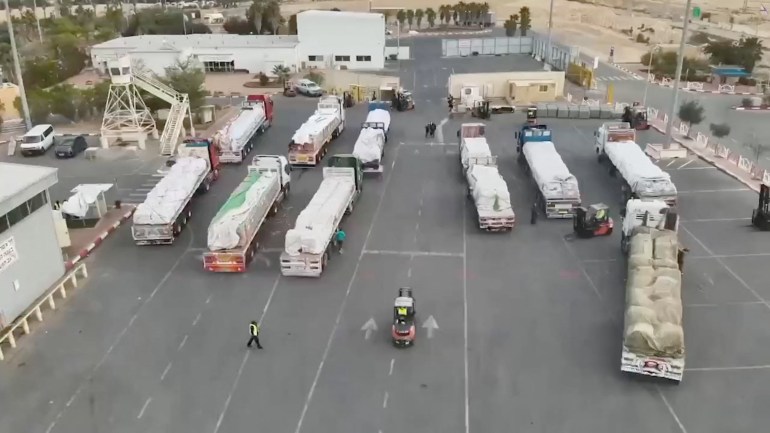[ad_1]
Aid was stranded near Egypt’s border with Gaza as Israel resumed its military campaign on Friday, with truck drivers saying they expected further delays to a complex delivery process that had briefly speeded up during a weeklong truce.
“The bombardment has been going on since seven in the morning. There are planes and artillery and we haven’t moved,” said driver Saleh Ebada, who had already been waiting to enter the crossing for inspection for eight days when fighting restarted.
Egyptian security sources and a Red Crescent official said aid and fuel trucks had stopped entering from Egypt.
UN officials described the resumption of fighting as “catastrophic” and said the continuation of aid delivery was in doubt.
A spokesperson for the Rafah border crossing confirmed that the entrance of trucks carrying much-needed aid, fuel and cooking gas from Egypt into the Gaza Strip had stopped because of the resumption of the Israeli bombardment.
Rafah has been the only entry point for aid going into Gaza since Israel began besieging and bombarding the coastal territory in retaliation for a lethal October 7 incursion and the capture of hostages by the Palestinian armed group Hamas.
Ashraf al-Qudra, spokesperson for the Ministry of Health in Gaza, appealed to “every living conscience” to allow the opening of the Rafah crossing amid an “extremely catastrophic” humanitarian crisis.
“The medical aid that entered Gaza during the truce is only enough for one day,” al-Qudra said in a statement. “The health sector in Gaza is out of service in every sense of the word,” he said.
Only three hospitals are functioning in Gaza and they are not equipped to receive a large number of patients, he added.
His comment came as Israeli air attacks killed at least 109 people and wounded hundreds, according to Palestinian officials. Medics are struggling to help patients who are piling up on hospital floors amid a shortage of beds.
More than 15,000 Palestinians have been killed in Gaza since October 7, Palestinian officials say. In Israel, the official death toll from the October 7 attack stands at about 1,200.

Aid during truce
International flights have been landing at El Arish airport in Sinai to deliver cargoes of aid. Convoys of trucks have also been bringing aid from Cairo.
Under a system in place since October 21, aid trucks had to drive for inspection to the Al-Awja and Nitzana crossing on Egypt’s border with Israel before returning to Rafah to deliver their cargoes, a round trip of more than 80km (50 miles) that aid workers and Egyptian officials say caused bottlenecks.
A truce over the past week allowed more food, medicines, fuel and water to be delivered, but the quantities remained far less than required for Gaza’s 2.3 million residents, most of them internally displaced by the war.
Egyptian truck drivers said they had been subject to lengthy delays while waiting for inspections and scanning of goods supervised by Israeli security personnel at Al-Awja.
“All the obstacles are there because they are the ones controlling the movement of goods,” said Gameel Mahmoud Idrees, a driver waiting near the Rafah crossing with a cargo of food supplies, his second delivery of aid since the war began.
“We enter the crossing and wait for four or five days until the inspection is completed,” he said.
The United Nations has lobbied for Israel to open the Karem Abu Salem (Kerem Shalom) crossing near Rafah which handled large quantities of goods before the war. But Israel, which fears aid could be used by Hamas, has so far refused.
The truce allowed for about 200 aid trucks to enter Gaza daily, more than double the previous average. That compares with as many as 500 trucks daily before the war, when there were fewer needs for urgent supplies.
Before the truce, Egyptian truck drivers had been unloading at Rafah, with goods loaded onto another truck for distribution into Gaza, and deliveries sometimes interrupted by shortages of fuel or bombardments.
During the truce, some trucks had been driving from the Egyptian side straight through into Gaza, Ebada said.
Idrees, the second truck driver, said as the fighting began again that he could easily be stuck for a week.
“We’re waiting until we get security clearance because there are around 350 trucks inside [at Al-Awja], and they have to be done with them first,” he said.
[ad_2]
Source link
